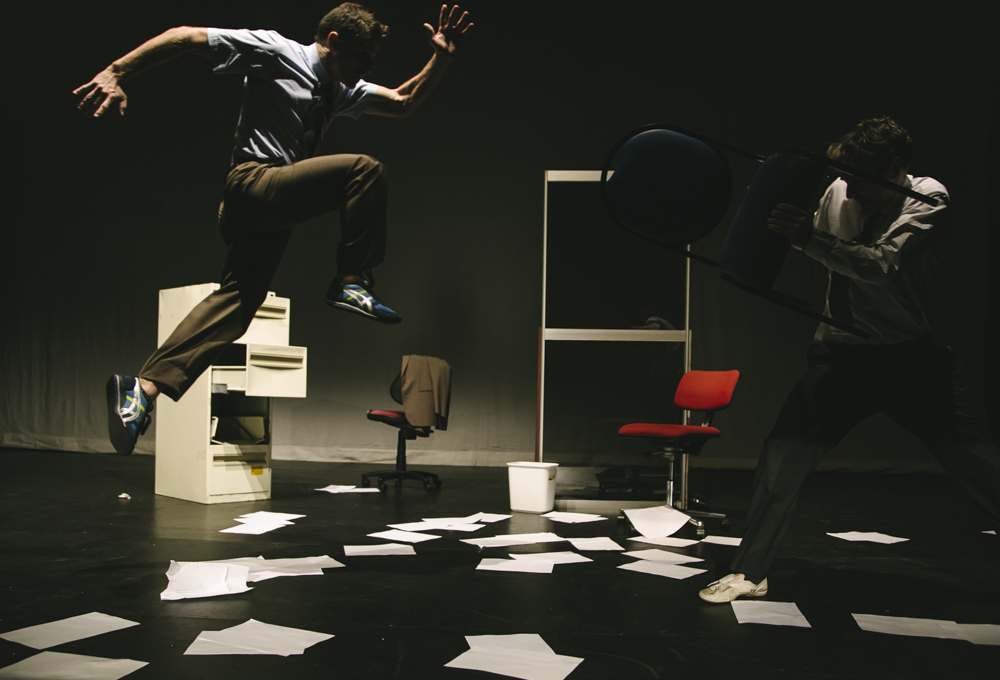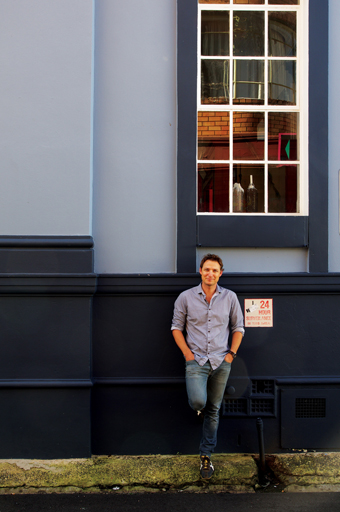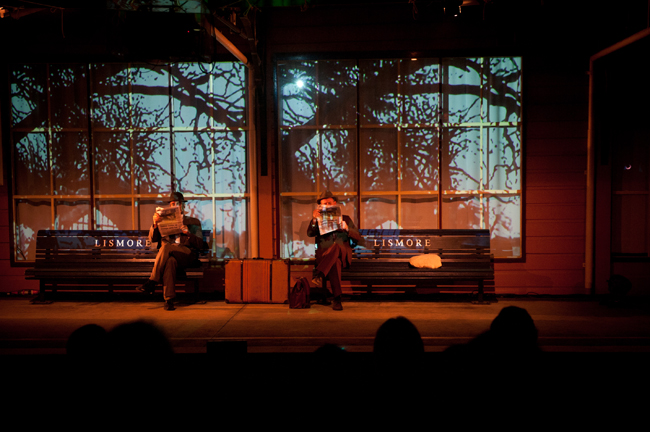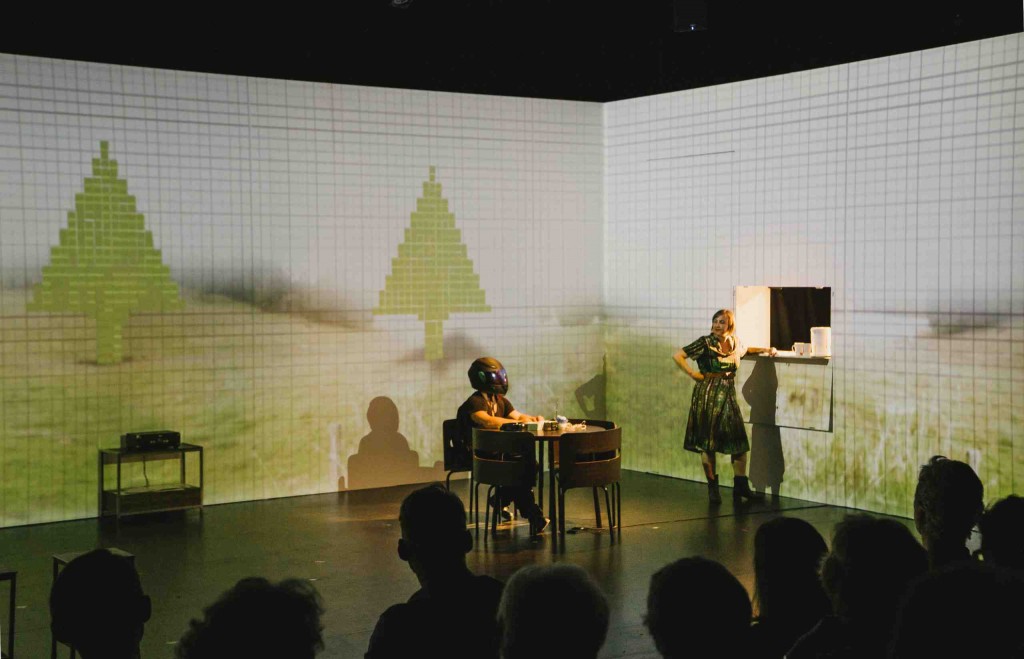The post Railway Wonderland – we say hello – and we say goodbye appeared first on .
]]>For me there’s always a certain anticipatory frisson about going to the theatre – there’s the idea that what I might be going to see is going to transport me into a world of fantasy in a way that film, even with all its bells and whistles, never quite manages.
Standing at the entrance of the now-disused Lismore Railway Station, transformed into a theatre set for the first return of Railway Wonderland, written by Janis Balodis and directed by NORPA artistic director Julian Louis, there was an almost tangible feeling of excitement in the cool evening air. An old shipping container was transformed into the pre-show night-time diner, fairy lights were strung, not just along the entire platform, but along the disused line as well, and the walk across the purpose-built bridge to the seating opposite the platform, suggested that transportation – of all kinds – might not be far away.
Almost 30 years ago I sat in a Sydney theatre, and succumbed to the charms of a new work by a young playwright, Michael Gow. The play, Away, set in the summer of 1967-1968, explored, amongst other themes, the effect of the Vietnam War on Australia, the death of a child, and the undercurrent of darker family tensions set against the inevitable annual summer holiday. Two years later I was wowed once more when Strictly Ballroom had its first major theatrical outing at the Wharf in Sydney, and it of course went on to cement Baz Luhrmann’s career – as a writer and director.
Both those works, and many others too of course in the canon of Australian theatre, owe a debt to a much older Australian play – Dimboola by Jack Hibberd, set at a wedding with the actors playing the families of the bride and groom, and the audience ‘playing’ the invited guests. Dimboola became a phenomenal success and in many ways it was not only the precursor of play such as Away and Strictly Ballroom, but it was also, one could argue, the spark that lit a certain style of Australian theatricality – rambunctious, irreverent and yet tinged with a certain deep poignancy. This melodramatic, occasionally musical genre slipped into film as well – Muriel’s Wedding, for instance, or Priscilla, Queen of the Desert, The Dish – even Red Dog, although the book was originally written by an Englishman of French extraction, Louis de Bernières.
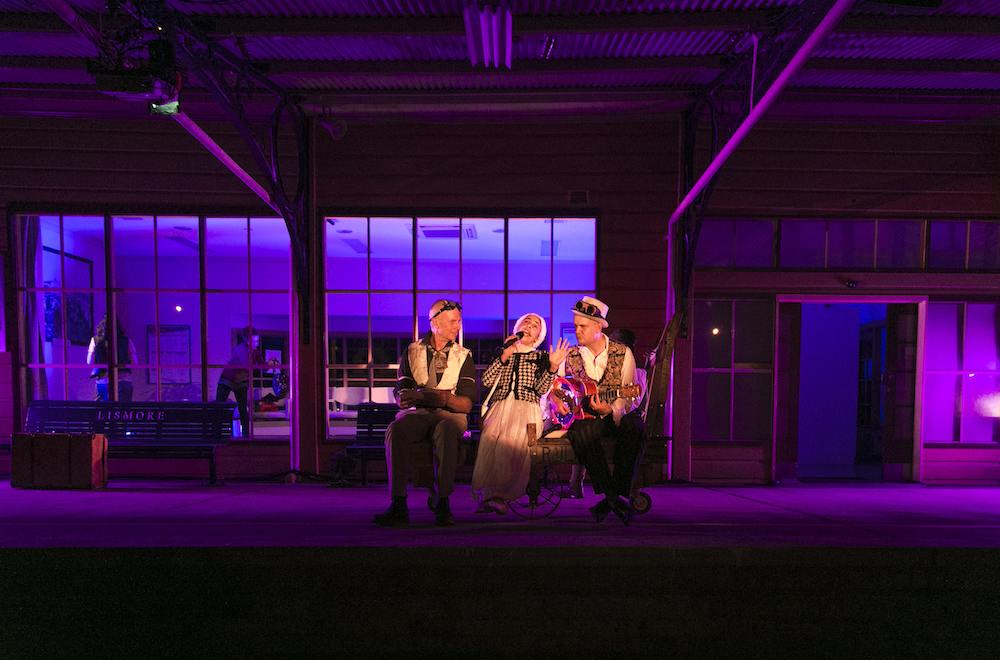
Ana (Katia Moliano) bursts into song, while behind her the bus passengers dance the time away. Photo: Kate Holmes
From the first moment of Railway Wonderland, as the wonderful sounds of the Vox Caldera choir under the masterful direction of Nicholas Routley, filled the night my sense of excitement increased. And I wasn’t disappointed – the story took off into the night, faster than a speeding XPT, taking all of us with it for the ride.
It was back in 2009 that NORPA asked the public to submit short stories about journeys or events that had taken place at Lismore Station. The last train had departed from there in May 2004, and these days the station waiting room is only used for the CountryLink buses, who make their way across from the coast, through the hinterland to Casino where they connect with the Sydney trains.
The company received an avalanche of material – from songs, to movies, to tales of migrants – many of them Italian – arriving in the region to create their new lives, and from all of these Julian Louis and a group of actors began to create a linked series of vignettes, in which strangers in the waiting room, begin to connect. The work was devised by the entire group and the script was formed from a collaborative process of improvisation, movement and character play by the cast. After that process Janis Balodis and Louis then shaped and fashioned a script together – with the cast members and Balodis being credited as ‘devisors’. Railway Wonderland had its premiere in 2012 in Lismore, and having missed it the first time, I was intrigued to catch up with it.
These days, of course, with cheap air travel, and the closure of many railway lines (including in this area) there are many younger people for whom train travel is not the essential experience of life it once was for so many of us. Seeing people off at train stations, waiting for loved ones to arrive, travelling through the countryside (gazing out of the window in a train reverie), and the importance of the train station to a local community were all something we used to take for granted.
The group, writer Janis Balodis and Louis have created something wonderful here – a melodramatic musical based around the theme of ‘hellos’ and ‘goodbyes’, the main story told by Anna, played by Katia Molino.
As a now-old Anna waits for the train that never comes, she talks directly to the audience, acting as a conduit for us between the disconnected group of people in the waiting room, and to her younger self, arriving as a sixteen-year-old proxy-bride at Lismore station, only to be greeted by Giacomo (Phillip Blackman), who is less than impressed by the first sight of his young bride.
Molino strikes just the right balance with Anna, as she segues between the present and the past, confusing the young man waiting for the bus, who is going to Sydney to tell his Greek mother that he doesn’t want to marry a girl, he wants, “to marry Dave’, with her son Marco, who was drafted into the Vietnam War, and returned only to leave home, of course, as children do. Dave/Marco is played by Demetrios Sirilas, an actor with an easy charisma, and, not surprisingly given his name, a fabulous line in an Effie-style Greek Mother accent.
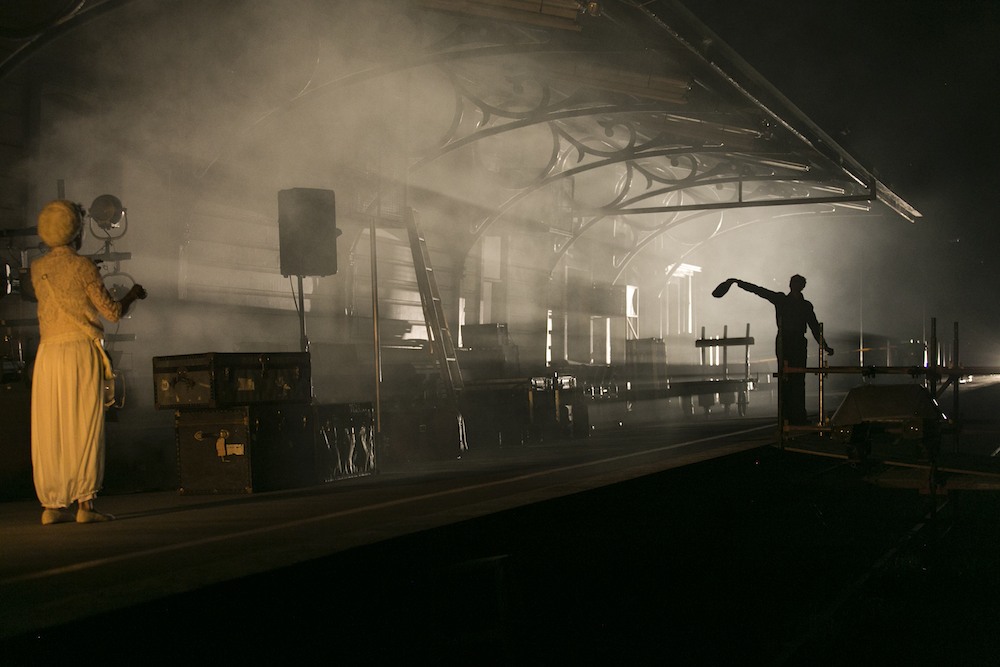
Anna waves goodbye to a ghostly Giacoma on the platform at Lsimore Railway Station. Photo: Kate Holmes
Other characters include sixteen-year-old Kelsie, whose boyfriend has stood her up at the last minute. Kelsie is left to work out what she might do if she goes to Sydney, figuring that perhaps she’ll go anyway and look up her Dad. Kelsie is played with extraordinary force and energy by Helen Christinson, who also doubles, or triples, as Laura and Diana, with Laura’s dramatic falling in love with Alec, played out in short, sharp scenes mimicked by old movies projected behind. Jo Turner who plays the upper-crust Alec, smitten by the tall redhead he accidentally meets on the platform, also doubles as Garry, your classic diamond in the rough, on his way to an audition for ‘Orstraya’s’ Got Talent, with a can of 4X and a ciggie never far from his hand. In a neat juxtaposition to Kelsie’s dilemma, Garry wonders if the daughter he left some years before might be open to a visit from him.
Local dancer and choreographer Phillip Blackman proves why every performer should at least have some dance training, bringing an edgy precision to his on-the-spectrum character of Leonard, and a poetic grace to Giacoamo, Ana’s initially reluctant husband. Leonard, it turns out, works in IT at the local nursing home, and knows all there is to know about railway and bus timetables.
The other ‘character’ that is never far away is the audience, seen only by Anna, who breaks down the Fourth Wall to speak directly to us, involving us in her recollections of train-station memories, and the audience is delighted to go along with the device, with most of us, I’m sure acknowledging the deep emotions that are inherent in greetings and goodbyes. At one point, when Garry remarks that he doesn’t believe in angels, we become part of a heavenly host, and at the same time an increasing awareness that Anna, although she tells us she is going to catch the train, and start her journey back to Italy, is perhaps closer to heaven than earth.
The wonderful, almost theatre of the absurd, style dances, the soaring voices of the choir singing everything from Verdi to That’s Amore; the combination of low-tech props with the high-tech AV and projected images; the songs, sometimes daft, sometimes deeply emotive, along with the poignant use of the once-loved now deserted railway platform, make this a night, and a play to remember.
It isn’t hard to imagine Railway Wonderland being performed right around the country, taking with it its message of integration, multiculturalism, changing mores, chance meetings – and the suggestion that life is a series of journeys. We’re here for the ride and we may as well enjoy it.
Railway Wonderland runs until November 7 at Lismore Railway Station. To purchase tickets go to: https://norpa.org.au/ticket-info/buying-tickets-2/
Patron advice
Recommended for ages 6+
75 minutes (no interval)
Performances at Lismore train station, Union Street, South Lismore
Onstreet parking
Ticket prices
Adult $49
Senior $44
Concession $42
U18 $22
Read more about Buying Tickets, Concessions and Refunds.
Food and bar
Outdoor street diner, bar and music at the Lismore train station from 6.30pm.
The post Railway Wonderland – we say hello – and we say goodbye appeared first on .
]]>The post Comical and combatative, Cockfight explores the limits of physical theatre appeared first on .
]]>For the last eighteen months Gold Coast-based company The Farm has been developing the work as part of NORPA Generator (NORPA’s creative development program) in collaboration with NORPA Artistic Director Julian Louis. Cockfight will premiere at NORPA followed by performances in Cairns and Townsville with a national tour planned for 2017.
“The Farm are one of Australia’s most fearless and dynamic dance companies,” says Julian Louis. “It’s been exciting to collaborate with The Farm in a creative environment that is limitless and where there’s a real sense that anything can happen.”
Like an episode of The Office meets a cage-fight, Australian style, Cockfight is a comical, combative and ultimately tender performance that explores masculinity and pushes the limits of physical theatre.
It opens with two blokes in an office. One older, one younger. They challenge each other in a series of comical one-upmanships that build to a moment of impact where everything is suspended, the flash of bared teeth, the mutual reliance on the fight, the desperation and loneliness of success.
Cockfight is a poetic look at the power play that occurs between men and the frailty of the body. It is evocative of age and passing time and questions our culture’s desperate desire for achievement. Without each other these two performers have nothing left to fight for. Dance is a young man’s game. What happens when someone higher up the food chain gets weak and is ready to be taken down?
At the heart of Cockfight is a very real relationship between performers Joshua Thomson and Gavin Webber who have been working together for many years. Their humour, trust and understanding allow them to take extreme physical risks that will leave you on the edge of your seat.
Bringing together the inventive theatricality of physical theatre company The Farm with Julian Louis’ dynamic theatre making style, Cockfight will provoke and excite in equal measure. Come and see what happens when these two performers give it all they’ve got.
About The Farm:
Based on the Gold Coast with roots in Berlin, The Farm is an international network of highly respected artists, ranging from choreographers and independent dancers to musicians and designers. The artistic direction of the company is led by Gavin Webber and Grayson Millwood who have been making work together for the past fifteen years across four continents. The Farm works out of Queensland but retains and builds on its national and international pedigree and touring record. Touring highlights include, Venice Biennale, Tanzplattform (Germany), Barbican Theatre, Europe, Canada and Australia.
The Farm is driven by a desire to connect to anyone, from dance and theatre virgins to aficionados and professionals. Often described as cinematic, their work is based on universal subjects and themes that matter. The Farm create contemporary performances that transcend expectations of what dance can be and how and where it should be viewed.
“These guys make dance like the Coen brothers make films.” Sydney Festival
“Intensely theatrical movement with a keen Aussie sense of play and irony never far away.” Brisbane Courier Mail
COCKFIGHT Creative Team:
Cockfight was developed by members of The Farm with guest artist Julian Louis.
Directed by Joshua Thomson, Gavin Webber, Kate Harman, Julian Louis; performers Joshua Thomson and Gavin Webber; lighting design Mark Howett;sound design; Luke Smiles; set Design Joey Ruigrok and Joshua Thomson; producer Performing Lines
COCKFIGHT
By The Farm
NORPA at Lismore City Hall
Thu 17, Fri 18, Sat 19 September, 7:30pm
Diner & bar from 6pm
Running time: 70 mins (no interval)
Patron advice: Recommended for ages 15+
Bookings: 1300 066 772 or www.norpa.org.au
WORKSHOP: Saturday 19 September 5-6pm, NORPA at Lismore City Hall
Physical theatre workshop with The Farm for professional dancers. Led by Kate Harman, Joshua Thomson and Gavin Webber. For more details contact NORPA 1300 066 722 or [email protected].
The post Comical and combatative, Cockfight explores the limits of physical theatre appeared first on .
]]>The post The Show Man appeared first on .
]]>At heart he’s still a performer – after all, he roller-bladed at last year’s NORPA launch, but artistic director Julian Louis, who has held the reins of the Northern Rivers Performing Arts company for seven years, has learned the delicate art of balancing creativity and administration, writes Digby Hildreth, and lucky for us, Louis is in the for the long haul…
For Julian Louis, the success of a theatrical production is measured by the extent to which performers and audience share “the wink” experience.
That, says the artistic director of Northern Rivers Performing Arts (NORPA), is the silent understanding between the two, a joyous communion, acknowledging, he says: “That we are in the same place”.
It occurred – literally – in Railway Wonderland, a work Louis co-created with local writer Janis Balodis.
“For Railway Wonderland we built a seating bank on the tracks [at Lismore Railway Station], and the platform became the stage,” Louis says. “The actors came in to the waiting room through a window, moving in a stylised manner, almost like dance, to the tune of the Doors’ Hello, I Love You, sung by an invisible nine-piece community choir. Strangers find their place in the waiting room, and then this old woman appears, on her way home to Italy after her husband has passed away. She pulls out her tea set-up then she notices the audience and says, ‘Oh, you like to come early too, to get a good seat’. And she winks at us. A few beats later she pulls out a microphone and sings directly to us.”
For Louis, a moment like that is theatrical gold. “I like that breaking of the fourth wall, that sense that we’re here together,” he says. “The skill of it is if you can take the audience into being lost in a story, then jolt them out to remind them that this is a fiction and we are telling it at this moment to encourage thinking about these issues because they’re universal, they’re relevant. It’s a source of great joy and is what I’m addicted to.”
It was an addiction that started early. Louis grew up on the North Shore of Sydney, where his parents moved the family so he could attend Knox Grammar School. His school profile, he says, was as a sportsman, based upon his skills as a [full scholarship] basketball player and all-round jock.“I was fast and sporty across all games and that’s how the school saw me. But when it came to the scholastic stuff, I wasn’t performing that well…I wanted to be involved in dance and musicals, so I decided to move to a public school, and my parents were OK with that decision.”
He loved to dance and his Michael Jackson impersonations earned him “quite a bit” of prize-money at local talent competitions – and there was a bonus: “At the new school I joined a dance group and was the only guy among 12 girls. Great fun!” Thanks to a diligent girlfriend, his academic performance improved, but even before his HSC results were in he had been accepted for a degree course in theatre and media at Charles Sturt University, Bathurst. “What drew me there was the juggling,” he says. “I was drawn to the physical, like a sporty person but my dancing and theatre interests were also evident.”
We’re talking at Louis’ home, a large, light-filled old Queenslander that he and his wife Meg had transported onto a block on the Coorabell side of Federal and moved into just weeks ago.
It is silent, except for the birdsong and the breeze in the stands of rainforest near the house.
Louis has to be here, away from the office, to get his creative mojo working, he says – something that being the buck-stops-here bloke at the theatre company based in Lismore City Hall (LCH) doesn’t allow. That split – between administrator and creative – echoes a divide he confronted on his return from Europe, between performer and “theatre maker”.
Flying back to Australia he reflected upon his time working with “some of the best theatre makers in the world”, including Philippe Gaulier, with whom Louis trained in London and he thought “right, I’m finally a performer, an actor”. It was a hard landing: “I was going to ad auditions and TV scripts and I wasn’t getting jobs and it wasn’t really me; it didn’t feel right.”
He sacked his acting agent after realizing that to see the sort of theatre he wanted to be in, he’d have to make it, so he continued directing and formed an independent theatre company with the well-known playwright Nick Enright, who became a mentor for Louis before he died.
The pair devised a show for the Sydney Festival with no script as a starting point. “He was a writer wanting to work with me and without a text. He was seeking a community, a family,” says Louis. “It’s a big ideal for theatre artists – certainly for me – to have an ensemble, or a team, a family.”
Louis says he has come close to finding a family at NORPA, but the intimate collaborative experience he relishes wasn’t made easy by the demands of his job. “I’ve been busy producing other people’s work, bringing shows here, curating a season, working on funding applications. The renovations [a $6 million overhaul of the LCH venue] took a lot of energy. Now the time has come to focus in on building more work from me, smaller projects, to allow for some spontaneity, and build this sense of collaboration more easily.”
The urge for the “family thing” has its beginnings, of course, with his own family, which was close, supportive and, in his mother, Yvonne, at least, theatrical. “She was a teacher/librarian and she would get dressed up into costume and read books to kids, in the library, which was basically a theatre,” he says. “Mum’s a very creative woman and has been a huge influence on me. Now she’s a published author and wrote a beautiful book called A Brush with Mondrian about our Dutch roots.”
Louis’ seven years at NORPA has seen plenty of successful productions, including Railway Wonderland and My Radio Heart, which he devised after seeing local disability group Tralala Blip perform their “very complex, very beautiful” electronic music.
Other shows this year have sold out: “1984 was a huge success, as was Great Lake. Food was fantastic. Henry V did well.”
But he feels that the best is yet to come, and that the 2015 season is shaping up as “extremely exciting” for audiences. “We have a project called Cockfight that we are co-creating with an independent company called The Farm [also Animal Farm Collective], here and for Brisbane Festival next year,” he says. That’s a big achievement for us.” NORPA is working with The Farm’s Gavin Webber, a dancer and choreographer who Louis says “does some exciting work mainly in Europe at a very high level”.
Louis says the 2015 season will feature “great local work and some big travelling shows, one of which we’re going to announce shortly – and one I’ve worked hard on is a major state company with a really beautiful story with music of a very important indigenous figure in our history.That’s going to be one of the big ticket items next year, as well as two home-grown works which are going to be huge.We’ve also got a very big local show that we’re working on, that I refer to at the moment as the Bundjalung project because the working titles are yet to stick.Rhoda Roberts is directing that with some fabulous people contributing, such as the Bangarra Dance Theatre; also David Page, one of the country’s great composers for dance; Djon Mundine, curator and visual arts guru; Francis Rings is the choreographer and Melissa Lucashenko, who’s written a book called Mullumbimby and who’s also a Bundjalung woman, is writing a short story for us about three brothers returning to the area.”
Louis is committed to the Northern Rivers, and set on strengthening NORPA’s connection with the community. Says Louis: “One way we maintain vibrancy is with Generator, our theatre-making arm through which we engage with an original idea or a story or a community to create innovative new theatre using multiple artforms to tell stories of the region.”
The company has just been awarded an Arts NSW Regional Theatre grant to develop a locally produced work named Dreamer through Generator, to celebrate “the Northern Rivers wonderful melting pot of dreamers, visionaries, inventors, the creative or creatively mad, the rebellious and the passionate. All of our homegrown work comes from Generator,” Louis says. “There’s been a lot of work and it’s all been successful.”
Louis is an enthusiastic spruiker for Lismore, and the whole region. “Almost every show that travels through comments to me that this is the best audience they’ve played to on a national tour,” he says. “It’s the region, it demands and deserves culture. It demands adventure and human expression in abundance. The more we support it, the more we take a risk on a NORPA production the more we’ll generate and we aim to meet that with a real professionalism and a real bravery.”
The post The Show Man appeared first on .
]]>